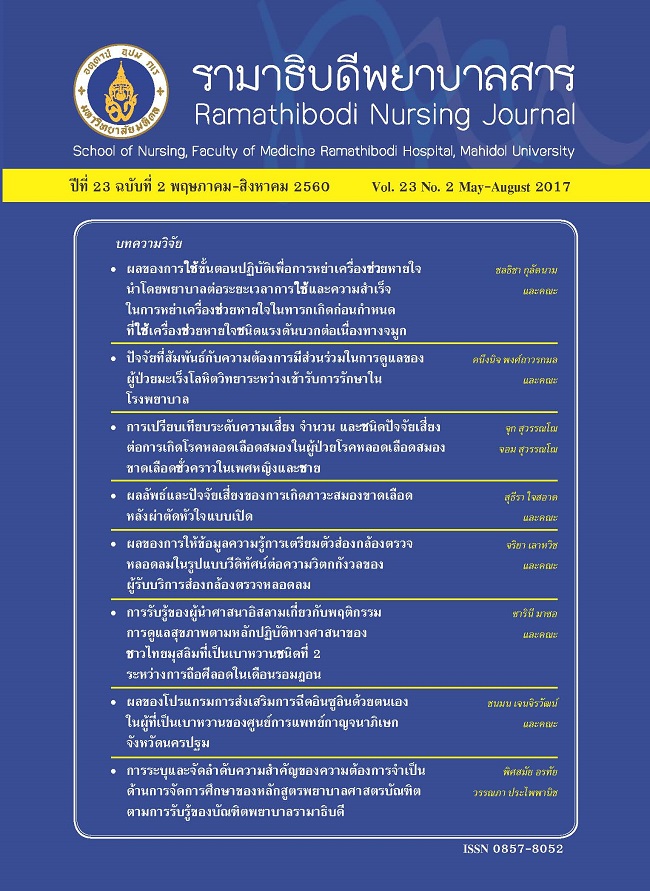Factors Associated with Hematologic Cancer Patients’ Preferences for Participation in Care During Hospitalization*
Main Article Content
Abstract
Abstract
Purpose: To investigate the patients’ preferences for participation in cancer care, and the relationships among person-and-illness-related factors (age, gender, co-morbidity, the elapsed time since diagnosis, length of hospital stay, number of symptoms experienced, symptom burden, and preferences for participation in care among patients with hematologic malignancies during hospitalization.
Design: Descriptive correlational research.
Methods: The study sample consisted of 150 hematological cancer patients who were receiving care as inpatients in one university hospital in Bangkok. The subjects were recruited by convenience sampling. Data were collected using 1) Demographic and Disease-related Characteristics Questionnaire, 2) The Control Preference Scale, and 3) Memorial Symptom Assessment Scale-Global Distress Index. Data were analyzed using descriptive statistics and Spearman’s rank correlation.
Main findings: Approximately one-third of patients (30.0%) preferred adopting a passive role (the patients leave all decision to their doctors and nurses), followed by 28% of a passive-shared role (the doctors and nurses make the decision after seriously considering the patient’s opinion), and 21.3% of a collaborative role (patients and nurses/doctors share responsibility in decision making for care). Patients’ preference for participation in cancer care was negatively correlated with age (r= -.278, p= .001), co-morbidity (r= -.253, p= .002), and positively correlated with time since diagnosis (r= .161, p= .05), number of symptoms (r= .161, p= .049), feeling sad (r= .161, p= .048) and feeling irritable (r= .188, p= .021).
Conclusion and recommendations: Oncology nurses should be aware of person-and-illness-related factors in promoting cancer patients’ involvement in their care during hospitalization for improving patient safety and quality of cancer care in the future.
Key words: Patients’ preference for participation, Hospital stay, Cancer symptom burden, Person-and-illness-related factors, Hematological cancer,
Corresponding Author: Associate Professor Kanaungnit Pongthavornkamol, Faculty of Nursing, Mahidol University, Bangkok 10700, Thailand, e-mail: kanaungnit.pon@mahidol.ac.th
* This research as part of a collaborative project between Faculty of Nursing, Mahidol University and Deakin University, Australia, was funded by Deakin University’s The Centre for Quality and Patient Safety Research.
1Faculty of Nursing, MahidolUniversity, Bangkok , Thailand.
2Faculty of MedicineSirirajHospital, MahidolUniversity, Bangkok, Thailand.
Article Details
บทความ ข้อมูล เนื้อหา รูปภาพ ฯลฯ ที่ได้รับการตีพิมพ์ในรามาธิบดีพยาบาลสาร ถือเป็นลิขสิทธิ์ของวารสาร หากบุคคลหรือหน่วยงานใดต้องการนำทั้งหมดหรือส่วนหนึ่งส่วนใดไปเผยแพร่หรือเพื่อกระทำการใด ใด จะต้องได้รับอนุญาตเป็นลายลักษณ์อักษรจากรามาธิบดีพยาบาลสารก่อนเท่านั้น


